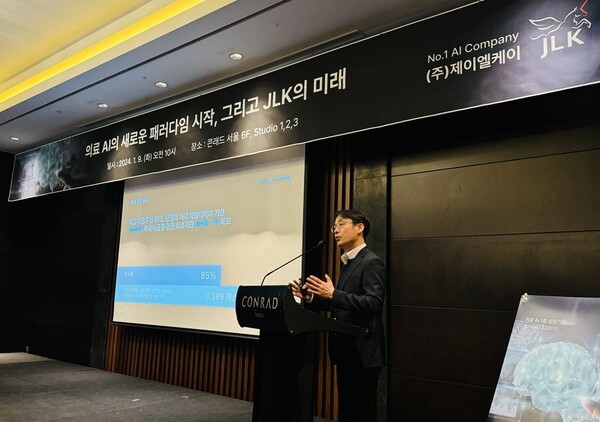JLK, a Kosdaq-listed company that provides brain image AI analysis solutions, said Tuesday that it aims to achieve annual sales of 600 billion won ($456.5 million) by 2028 by boosting its AI services within the U.S. market.

JLK has 11 products, including JBS-04K, a brain hemorrhage detection solution, and JBS-01K, a cerebral infarction classification solution.
To attain its sales goal, JLK aims to secure a market share of over 10 percent in the U.S. by submitting papers, acknowledging the performance and universality of its products. Currently, JLK is in the process of obtaining FDA approval and NTAP (New Technology Add-on Payment) reimbursement in the U.S.
Stroke refers to cerebral hemorrhage, in which a blood vessel in the brain bursts, and cerebral infarction, in which a blood vessel in the brain is blocked.
"Stroke is a prevalent disease, affecting one person every three seconds worldwide, with 73 percent of stroke victims experiencing severe sequelae, including permanent disability." said Kim Dong-min, CEO of JLK, explaining why JLK chose to focus on stroke.
At the event, experts also emphasized the need for JLK's brain image AI analysis solutions in hospitals.
"Cerebral infarction is a common disease, and it can be treated if patients come to the hospital in a short time," said Kim Dong-eok, Professor of Neurology at Dongguk University Ilsan Medical Center, explaining that JLK's solution could have the same effect as stroke specialists judging brain images day and night.
Kim Chi-kyung, Professor of Neurology at Korea University Guro Hospital, said, "We are using JBS-01K to detect very small cerebral infarcts at the emergency site," adding that without JBS-01K, it would have taken longer to detect, making it difficult to treat in time.
Stroke patients' conditions change over time, and AI analytics can provide an integrated solution that analyzes all images over time, not just one point in time, JLK said.
Chung Jong-won, Professor of Neurology at Samsung Medical Center, highlighted the significance of swift stroke treatment through AI solutions, stating, "In stroke treatment, determining the number of viable cells remaining is crucial, but it is time-consuming when done visually."
According to JLK, after receiving non-reimbursement approval in February last year, 100 medical institutions adopted JLK's solution in five months and 210 in 10 months in Korea.
"By 2028, JLK will have a market share of approximately 85 percent in Korea," said Kim Dong-min, CEO of JLK. "Our goal is to position JLK's solutions as a hospital infrastructure that should be deployed as a matter of course, not as an option."

